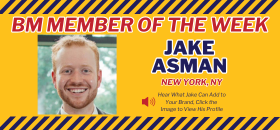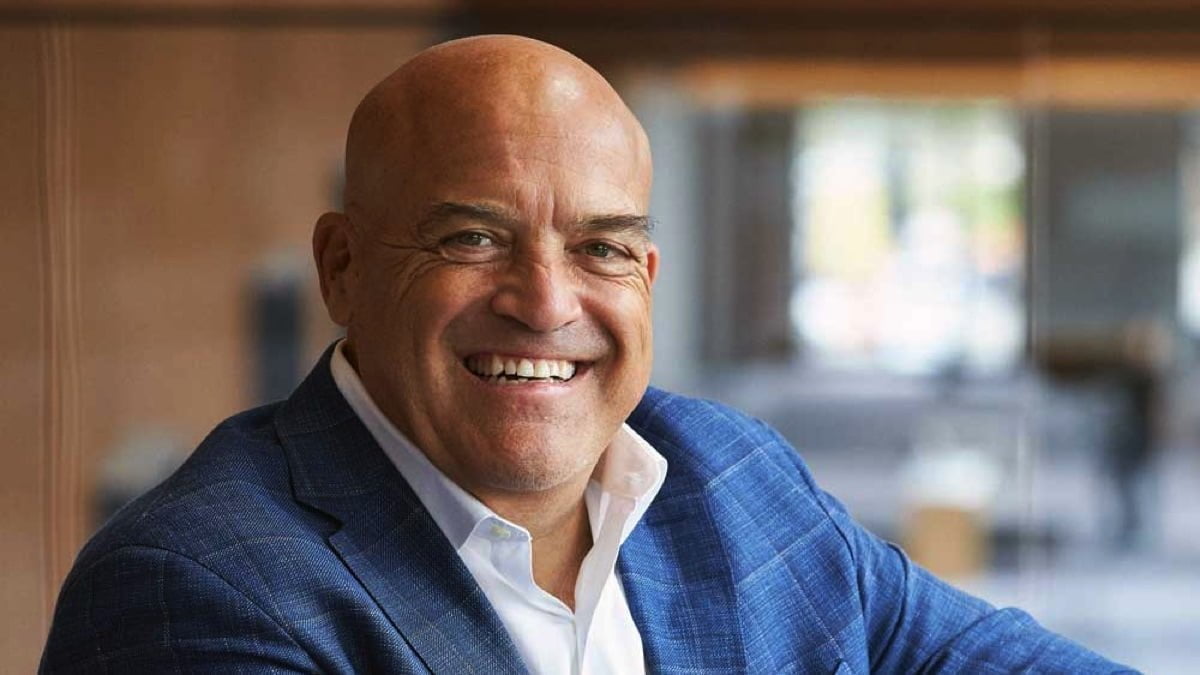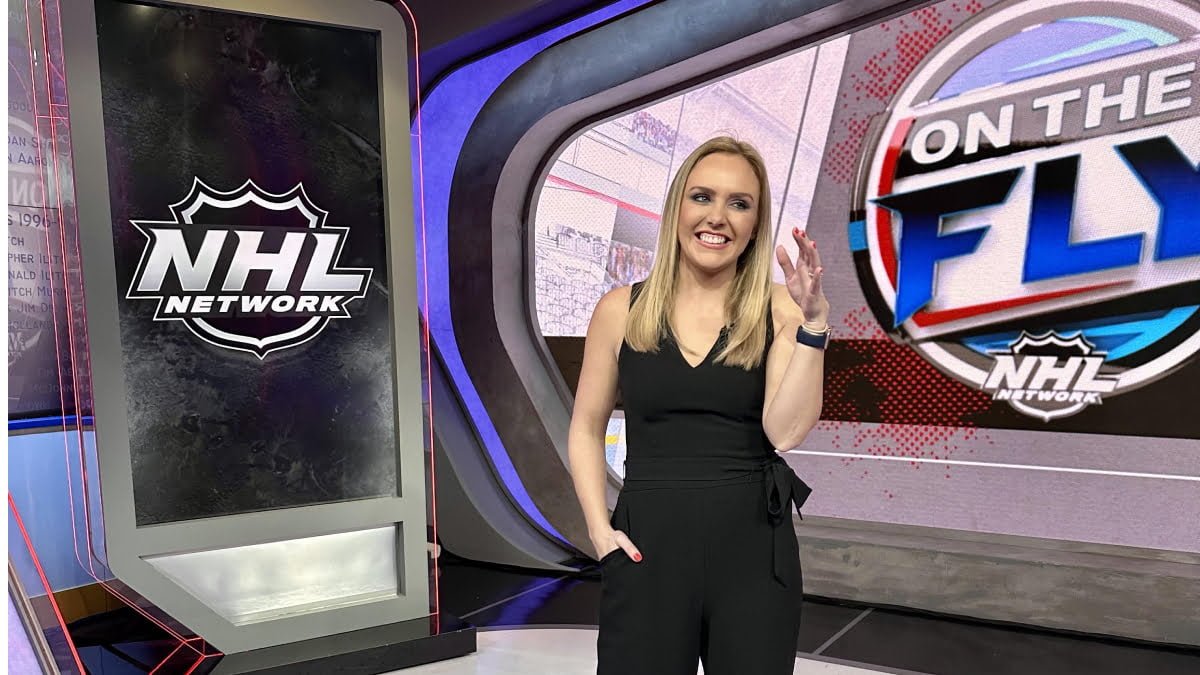Radio is an unstable industry to earn a living. This is not breaking news. The interesting thing is that it’s just accepted. Similar to how people in Miami accept hurricanes or residents in Los Angeles accept earthquakes, most people that work in radio simply accept that they could be out of a job at seemingly any moment. Steak Shapiro has been a sports radio host in Atlanta for over 27 years. The cool part about Shapiro’s journey is that he didn’t just shrug his shoulders and accept random dismissals.
After he lost his initial gig in Atlanta back in 1996, Shapiro took an uncommon approach. He realized that it would be a lot harder to get fired if he owned a company instead. Yeah, makes a lot of sense. For over a quarter century, Shapiro has been part radio host, part business owner. Pretty cool. I picture radio employees that have been fired, raising a glass and saying, “Right on, Steak. Good for you, man.”
Shapiro talks about his weekday show at 92.9 The Game, and how rotating co-hosts keeps The Steakhouse fresh. He touches on the aftermath of a mini sparring session he had with Georgia quarterback Stetson Bennett on Twitter. Shapiro also explains how much better his reality in Atlanta has been compared to his expectations and reveals the story behind his stage name. Enjoy!
Brian Noe: How are things going for you at The Game?
Steak Shapiro: It’s awesome, great station. Biggest station I’ve ever been on, 100,000-watt Audacy property. Really the king of the sports talk format in terms of that company. The two-hour show, they’ve afforded me to have a shift that really works given the other projects I’m involved with. I work with the people I asked to work with.
Sandra [Golden] and I are back together three days a week. Then I have Rusty Manzel on Wednesdays. He’s the number one recruiting guru in the Southeast. And then Drew Butler who’s a rising star in the media business. Five years in the NFL, played for Georgia, super creative. The five of us including my producer, Orin Romain, who worked for me back at The Zone years ago.
First time I’ve ever had my name in the show title, which is cool. It was always Mayhem in the AM, Mayhem in the PM, or other stuff. It could not be going better. It’s great hours, I don’t get up for morning drive anymore. It doesn’t take away from the company I run, Bread n’ Butter / Atlanta Eats. It’s the type of show that they want me to do — sports, food, business, entertainment. It’s built on the notion that sports is not the end all, be all. It’s super fun. It’s awesome. We’re crushing in terms of our ratings and numbers. But more importantly, it’s just a daily radio show is what I love to do. I’m very happy.
BN: How would you describe what it’s like to host the show with three different co-hosts on various days during the week?
SS: I just enjoy the collaboration part of radio. I like these three people so much. They’re like me, they’re funny, they’re entertaining. Every day, they’re excited because it’s their one day of the week or one of three days. I think a great radio show is built on the energy of the people in the room. I’m always excited. I may not be the most talented talk host in history, but nobody gets more excited to be doing sports talk and doing radio. I just enjoy all three of them.
I just change the format a little depending on who’s there. Sandra and I are like Kelly and Ryan, we’ve been together forever. We know each other like we’re work wives and husbands. Sandra and I have been together on and off for 20 years. Then Rusty and Drew are just great guys. It’s fun. Instead of making it challenging, it makes it easier because each person comes in completely fresh.
That’s their one two-hour shift to be on a 100,000-watt station that is the dominant station in Atlanta. When Rusty comes in, or Drew comes in, or Sandra comes in, they’re so fired up to be there. Radio can be a grind. Same people every day trying to make it fresh; it’s not a problem because it really is fresh with these guys. It’s what I enjoy, which is just being with different people on different days.
BN: What stage of your career did you think, man, I’ve got to have more stability professionally than just radio?
SS: I moved to Atlanta in 1995 to do mornings. I was fired in 1996 and I was like ‘Oh shit, that was my big break’. I was in my 20s. Next thing you know, I was out of a job because the Dickeys, David Dickey and their family, leased their station to Cox. We were essentially all fired by no fault of our own because somebody else took over the format, and they didn’t want edgy sports talk hosts. They wanted to kill the format.
I was engaged to be married to my first wife and I thought to myself, this is going to be my future. I’m going to have to move every few years. I’m always going to be chasing the next big market. I’m going to be beholden to new radio ownership. I’m going to be beholden to a new program director. I’m going to be beholden to my co-hosts or me doing something dumb on the air.
I started raising money and building a business model my second year in Atlanta. Remember we lost our job because the other folks that leased 680 back then, they didn’t want to do sports talk. That left an opening. I basically started on the entrepreneurial side right when I got fired the first time. I thought this is going to really suck; I didn’t grow up with parents in the business. I grew up in a pretty stable environment and I was like radio is opposite of stable. Radio is a friggin’ nightmare in terms of setting down your roots.
I was an owner and on the radio for 17 years straight. I figured the best way to not get fired, is to own the radio station. I say that facetiously in a way, but also like, you got to control your own destiny, so I was an owner. I was an on-air personality. I was head of marketing and programming for essentially 17 years, and I was able to raise my family in a great city.
Then when I sold the business to Lincoln Financial Media, I raised money immediately for a new business, Atlanta Eats / Bread n’ Butter. And for the right reason, because your co-host could get on-air and say the wrong thing, which is what happened to us. Then we were out of a job, or your boss can tell you during COVID, you make too much money, we don’t want to pay. I think he phrased it when he fired me and [John] Kincade, no more heritage radio contracts.
Here are situations by no fault of my own where I’m out of a job, and if I didn’t own a company that was my 9-to-5 really, then I would have had to move. I would’ve had to uproot my family. I haven’t been perfect with my career, but the one thing I’ll give myself credit for is I understood that ownership of a business would provide the stability I wanted, and that radio was never going to provide that stability.
BN: You’re the longest running radio and TV host in the city. With everything that you just described, what does that mean to you considering the instability of the industry and how you strategically positioned yourself?
SS: Well, I’m super proud of the opportunity I was given. When I was seven, eight years old, my dream was to be on the radio and talk about sports. I’ve done that with gaps in between, very small gaps, for 27 years. It also speaks to something you probably know now which is the Southeast was the place to come grow your career. The Atlanta’s, the Charlotte’s, the Nashville’s, the Orlando’s, the Tampa’s, phenomenal places if you’re aggressive about building a career. These are great markets to build stability. Listen, I’ve had a lot of bumps in the road, but I’ve hung in there.
At the end of the day, almost every on-air personality in the city of Atlanta, I hired in radio. Nick and Chris were hired by me, Chuck and Chernoff were hired by me, Kincade was hired by me, Mike Bell. I think I understood talent. All those guys have been on the air for 20 years, and every one of them was originally hired by myself at the other radio company. I think that says that Atlanta is a great market, that if you’re talented you can survive.
It also says that if you worked at The Zone, it was a pretty stable place. We never flipped formats. We never got bought by anybody. We stayed the course. We also were the originals of really building the format. Then 680 got back in the format when they saw how we were doing. Now you went from one sports station to two in the market, which is why everybody has been able to work in the same market for so long.
I’m very humble about it. I’ve had my ass kicked numerous times, as anybody who’s 56 years old. As Tom Brady said, I’m 46, I’ve got a lot of shit going on; I’m 56, I’ve had a lot of shit go on. But I’ve never had to leave Atlanta. I built a national name by never having to leave this town. And I’ve worked with everybody in this town in some way. It’s just Atlanta is a great town. I moved here, there were 1.5 million people. There’s now 7 million. We’re bigger than Boston, bigger than DC, we’re one of the biggest markets in America.
BN: You’ve been at The Zone, The Fan, and now The Game for multiple decades. When you think back to your initial move to Atlanta, what was in your head back then and how far away was it from the reality of what actually came to be?
SS: That’s a great question, nobody’s ever asked me that. My mindset was, the only way to get good at being on the radio was to be on the radio. You’ve got to find somewhere that you can be on the radio. You’re not going to get better being a producer, you’re not going to get better doing news, you’ve got to be a sports talk host. My only thought was just do a good show every day, promote yourself, be good to people and good things will happen.
I never thought I’d raise a family in Atlanta. I never thought I wouldn’t move market to market. I thought I was going to Philadelphia, to WIP. I thought I was going to go to WEEI and other stations. What happened was the farthest thing. To marry a girl eventually from this town, to have three kids, make my roots in Atlanta, and then to own a company; I had no desire to own a friggin’ radio company, media company.
I’m an on-air guy, I was an English major, I got a master’s in journalism, I didn’t know jack shit about owning a business, or being an entrepreneur. That part of my career is completely out of left field in terms of my dreams and in terms of what I envisioned. To now have owned a business in the city for 27 years, 17 at Big League Broadcasting, and now a decade of Bread n’ Butter Content Studio and Atlanta Eats, that is certainly the biggest surprise. Being in the same market, and being a staple of the city and an ambassador of Atlanta, never thought that would happen.
I never set foot in Atlanta, as a Boston guy through and through, your typical Masshole Boston sports fan, lived and breathed. I didn’t know shit about the SEC. I didn’t know about NASCAR. I didn’t know college football. Now those are like the back of my hand. I’ve been to more Georgia football games and SEC. I’ve covered more. I know more about Southeast sports history than Boston.
The most important lesson is just work hard every day, treat people well, try to get better and good things can happen. Anybody that comes through my office, I say, dude, just work hard, do a great show, opportunities happen. If you own a radio company, I never had a reason to leave. I was offered gigs at ESPN and back home in Boston. Why would I leave when I have stability? That’s the biggest surprise is being a business owner. It happened by chance. It happened because I got fired. Truly the expression one door closes, it just creates an opportunity that you never dreamed of. That’s happened to me numerous times.
BN: I wanted to get your thoughts on the Stetson Bennett thing. Now that it’s been over a month since your initial criticism and his response, what are your thoughts about that entire situation?
SS: First of all, what I said was what everybody other than Georgia sycophants were thinking, which is why is he behaving that way? Why isn’t he being more gracious? The only reason it went viral is because Stetson Bennett never ever posts, never does an interview. Obviously, someone said you’re getting a ton of shit, you need to address this. He decided to address it by writing a letter to me, which I thought was funny.
I love Stetson Bennett, his career. I have no problem with him. It wasn’t personal. It wasn’t aggressive. It’s like do better, be better. When you get on social media, and you get to 9 million views for one tweet, that tweet had 9 million views, we were in The New York Post, the LA Times. It was a sensational story because it was a quarterback of a national title team writing a letter to a radio talk host. The letter he wrote me was kind of a jumbled, funny letter calling me “Mr. Steak and Shake” and “Mr. Medium Rare”. If you read what I wrote about him, it really was fairly tame.
I’m not out to hurt people’s feelings, but I’m paid to give my opinion. But is it toxic out there? Yeah, the toxicity of going on the radio, you are putting your career on the line every single day that you are speaking extemporaneously for three hours. The wrong thing said in that three-hour window, and the wrong thing on social media, could cost you your gig. I’m not complaining about it. That’s just a fact.
You see it. Look what happened in Boston last week with Mazz. He didn’t lose his job, but it was a helluva shitstorm. I’m not going to comment on what he said, other than when you have to talk extemporaneously for three or four hours, you have to be super careful. And then at the same time, you’ve got to be funny, you’ve got to be knowledgeable, you’ve got to be edgy, you’ve got to be able to be more dynamic than some guy who’s just driving around town. You’re paid to be interesting. If you’re boring, you’re not there.
One thing I’ve never been is boring. Now, you may love me or think I’m overrated, but I’m not boring. But at the same time, you’re in the era where every day on the air and every tweet you write could cost you your current gig. It won’t cost you a career, but it could cost you the current job you’re in. I think everybody in my job now understands that and probably every writer, broadcaster, podcaster, interview subject, if it comes out the wrong way, then you’re in a vulnerable position.
BN: When you think about your future over the next five years — radio, businesses, projects — what do you want it to look like?
SS: This is a format that I’m actually fresh. I’m 56 years old. There are guys that do sports talk into their mid to late 60s, 70s. I’m right in a sweet spot for the format. I love doing my show. I want to grow my business into the biggest content agency in the Southeast. I want Bread n’ Butter Content Studio to be the biggest and brightest content agency around digital, storytelling, video content, unscripted. I love building companies, one day maybe sell the business. But I’m in the prime of my career in terms of owning a business. And I’m in the prime of my career in terms of being on the radio.
I don’t want to jinx myself and predict the future, but I’d like to see the content side of my business grow into one of the most influential. I want to be the highest rated sports radio show in Atlanta and in the Southeast. There’s nobody better at what I do in Atlanta. There’s a lot of people who are good at it, so I just need to keep doing well every day and then good things will happen.
And just be grateful. I mean shit, like you said, moving here I didn’t think it’d turn into one of the biggest markets in America. I didn’t think I’d own two companies. I didn’t think I’d get to be on the air for 25 years, have a Food Network show, do national TV, CNN, Fox News, all these things. Never dreamed of that. I don’t want to jinx myself, I’m very grateful. When you start not being grateful, or acting like an asshole, or acting like you deserve it, that’s when something bad is gonna happen. I don’t want that to happen. I try to be grateful with every person I come across in the business.
BN: Steak obviously isn’t your real name. What’s your actual name and how did Steak Shapiro come to be?
SS: So my real name is Stephen. I worked in Boston. I was at a sports talk radio station, WEEI, in the ‘90s. I was the producer, a really lousy one. The most famous sports talk guy in Boston history, Eddie Andelman, saw me in the office. He had just been to a steakhouse in Minnesota called Manny’s. The specialty of the house was steak shapiro at Manny’s. He started calling me Steak around the office.
I got my first chance to be on the air on a regular basis and I said, I can go as Stephen, which sounds like what my mother says to me when I’m in trouble, or now my wife, or I can come up with Steak, which sounds like a sports talk guy’s name. Now, I didn’t think I’d ever be in the food business; it’s actually even a better food name.
I owe it to the guy I listened to growing up. The reason I got in the business was Eddie Andelman because I listened to him every night when I went to bed. Maybe it was poetic justice that the guy that would give me my career name is the guy that made me want to be in the business. Eddie Andelman gave me the name in Boston back in the ‘90s.
Brian Noe is a columnist for BSM and an on-air host heard nationwide on FOX Sports Radio’s Countdown To Kickoff. Previous roles include stops in Portland, OR, Albany, NY and Fresno, CA. You can follow him on Twitter @TheNoeShow or email him at bnoe@premierenetworks.com.









Buck “Ballew” says you never hired him you overweight clown.